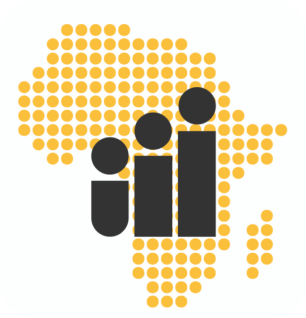Celebrating the heart of every country
Knowledge exchange and activities
Working together with governments, partners, and stakeholders, our community of practice serves as a viable platform for shared goals for protecting and preserving Africa’s human capital.
In April 2022, as part of our Annual Spring Meetings, the AFW Vice Presidency convened a ministerial-level roundtable event for an ongoing dialogue on how to build shared commitment and political will for greater investments in preparedness and health systems in the region. The Health, Nutrition, and Population (HNP) task team is currently preparing an ASA aimed at catalyzing and supporting a policy dialogue and operational engagement that stimulates more and better investments in health systems and emergency preparedness.
In June 2022, the Africa HCP team hosted a virtual Knowledge Exchange Forum – Strengthening Human Capital in Africa in a Context of Multiple Crises and Fragilities – focused on exchange of ideas and solutions on emerging crises and conflicts. Topic areas included financing and governance challenges; boosting women empowerment; pandemic preparedness and resilient health systems; tackling learning losses; and maximizing social protection.
Our Human Development climate team contributed significantly to the recently launched World Bank Group first in a series of new core diagnostic Country Climate and Development Reports (CCDRs) that integrate climate change and development considerations and help countries prioritize the most impactful actions that can reduce greenhouse gas emissions and boost adaptation.
We are also finalizing a number of policy notes and recommendations which combine and distill existing and new research to inform discussion and dialogue.
The World Bank launched the Sahel Education White Paper and the Western and Central Africa Education Strategy, two critical interventions around action plans to improve education access and outcomes.
We are also looking inward, building our Africa Human Development staff’s capacity on effectiveness and operational knowledge. These have included workshops from July-December 2021 with approximately 150 task team members in 15 countries, on a shared understanding of the importance of Development Policy Operations (DPOs) as a financing instrument that supports targeted policy reforms.


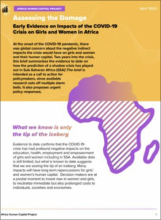
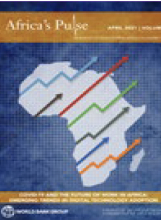
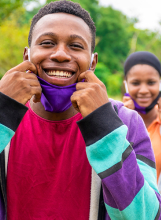
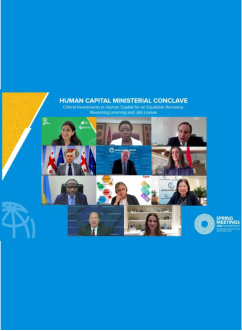
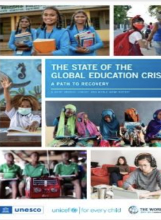
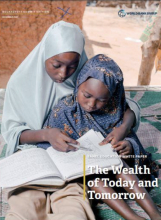

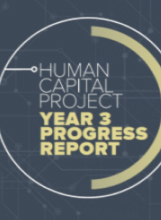
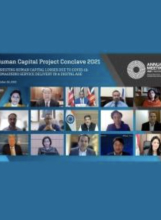
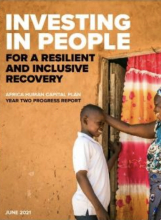
Africa Human Capital Plan Results Framework
| INDICATOR | Baseline (2018) | FY19 | FY20 | FY21 | FY22 (expected) | Target (FY23) | NOTES |
|---|---|---|---|---|---|---|---|
| Volume of IBRD/IDA commitments for human development sectors | $4.1 billion | $3.2 billion | $7.7 billion | $8.9 billion ($5.43 bn AFE, $3.47 bn AFW) | $8.2 billion ($4.38 bn AFE,$3.81 bn AFW) | $5 billion annual average | On track |
| Number of WBG Global Practices with targets on human capital in the region | 4 | 4 | 4 | 4 | 4 | 7 | In progress |
| Share of Development Policy Operations with a significant Human Capital focus | 70% | 71% | Greater than 70% | 90% | 64.70% | At least 80% | Reduction due to post COVID wave reallocations to other areas. |
| Number of high-fertility countries with integrated or coordinated projects across sectors to support women empowerment and the demographic transition | 7 | 9 | 11 | 13 | 17 | 20 | In progress |
| Volume of IBRD/IDA commitments for human development projects in FCV countries $514 million | $514 million | $1.5 billion | $3 billion | $3.9 billion ($1.6bn AFE, $2.3bn AFW) | $3.71 billion ($1.61bn AFE, $2.09 AFW) | $831 million | On track |
| Countries actively engaged in HC planning | 12 | 12 | 20 | In progress | |||
| Number of partnerships or coalitions supported by the WB around the Human Capital agenda in Africa, including with development partners, CSOs, faith organizations and traditional leaders. | 0 | 6 | 7 | 9 | 10 | In progress | |
| Number of African Human Capital Champions and influencers mobilized on the Human Capital agenda | 5 | 5 | 8 | 8 | 8 | 15 | In progress |
Celebrating the heart of every country
Putting people first
The Africa Human Capital Plan
Year 3 Progress Report
August 2022
Invest in people Empower lives
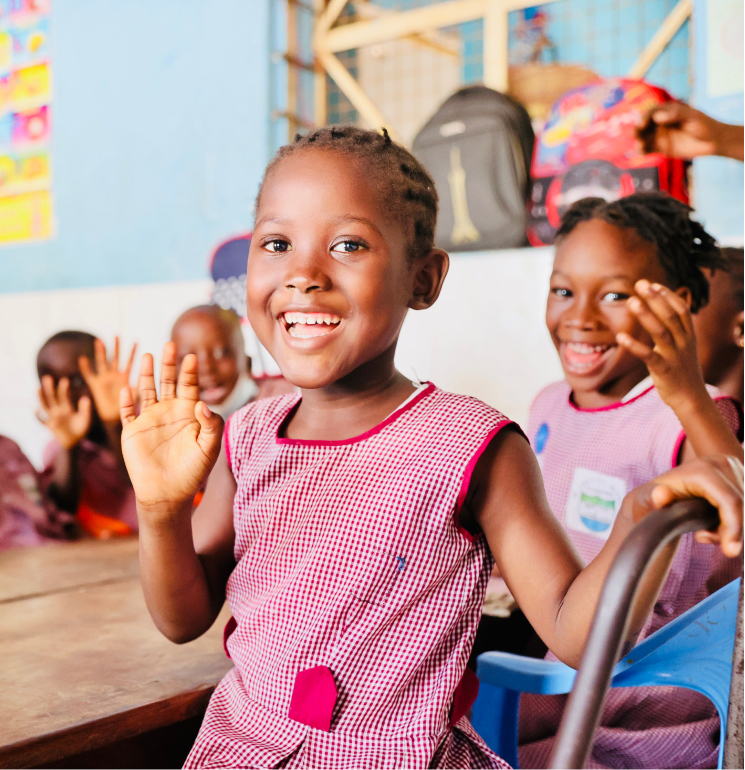
In April 2019, we launched the Africa Human Capital Plan (HCP) centered on a set of gamechangers and ambitious targets to be achieved by 2023 on child mortality and stunting rates, girls and boys learning outcomes, social protection coverage, lower adolescent fertility rates, better sanitation practices and an improved Human Capital Index score.
Assumptions made three years ago have been validated, as the Africa HCP provides a strong framework to address emergency response and inclusive recovery efforts as we take on COVID-19, climate change, and other compounding crises that threaten to erode the human capital of an entire generation.
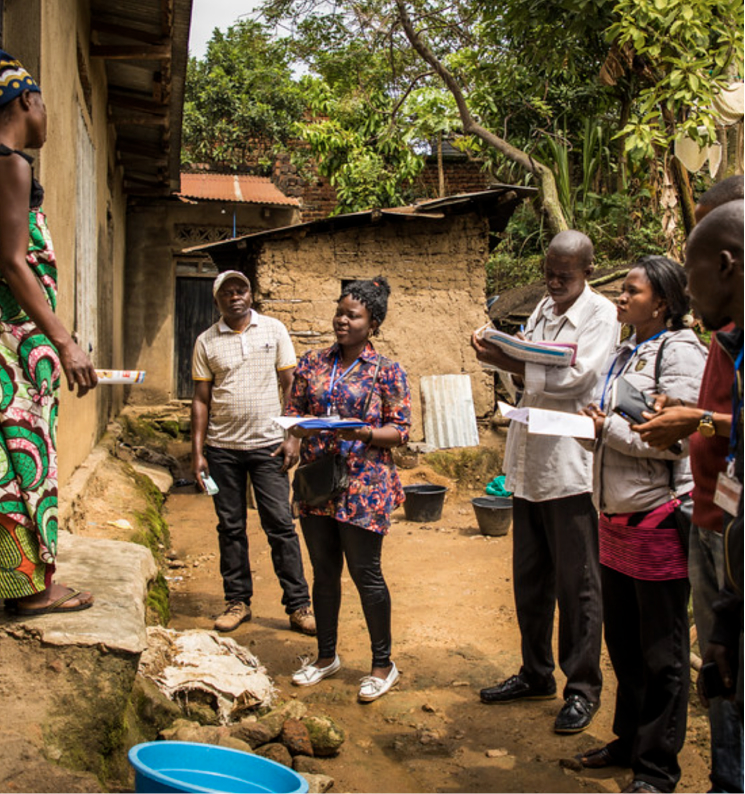
We continue to galvanize resources and foster multisectoral collaboration to strengthen social service delivery systems, empower women and girls, and embrace digital and climate-smart solutions. In just three years, the World Bank’s commitments in human development operations in Africa has reached an historic $34 billion.
Our mission has never been more urgent, and we are focused on prioritizing investments in key social sector determinants to improve human capital outcomes and economic growth in Africa. Because every African man, woman, and child should be equipped to realize their full human capital potential as productive members of their communities.
7 Gamechangers to Advance Human Capital Development
Accelerating the demographic transition by empowering women and girls
Increasing World Bank financing for human capital in Africa
Preventing and reversing damage to human capital in settings affected by fragility, conflict, and violence
Rallying World Bank country teams and partners around the human capital agenda to enable comprehensive cross-sectoral solutions at scale
Leveraging technology and innovations in projects to further human capital
Supporting policy reforms to overcome legal and regulatory constraints
Advancing research and advocacy to strengthen the knowledge base and the demand side of human capital
Africa HCP
Goals by 2023
Reduce Child Mortality
to save 4 million lives
Avert Stunting
among 11 million children
Reduce Adolescent Fertility
rates from 101 to 83 per 1,000 teens
Improve Sanitation Practices
to reduce open defecation from 23% to 15%
Increase Learning Outcomes
for girls and boys in school by 20%
PROVIDE SOCIAL PROTECTION
to 13 million more people
INCREASE FUTURE PRODUCTIVITY
of children born today by at least 13%
INCREASE FINANCING FOR HUMAN CAPITAL
in Africa to $15 billion
Investing and preserving
Africa’s human capital
The Africa HCP has set clear targets and commitments by 2023 to boost and accelerate scaled up financing for human capital, expand support across development sectors, and leverage policy and results-based human capital reforms. The components of the World Bank’s Human Capital Index (HCI) – survival, schooling, and health – all have direct links to the UN Sustainable Development Goals, and measure how well countries invest in their next generation of workers. While efforts of investing and preserving Africa’s human capital have been impacted and threatened by recent multiple overlapping global crises – including the COVID-19 pandemic, the Ukraine-Russia conflict, climate change-induced natural disasters, and regional armed conflicts – slow and uneven progress has been made towards achieving these target goals.
Progress on AFR HCP 2023 Goals
Scaling-up financing for
human capital in Africa
$34.3b
The human development portfolio in Africa supports health, education, and social protection, and jobs
$11.5b
New investments championing women and girls in Africa since the launch of the AFR HCP
$8.2b
World Bank Human Development financing in Africa in FY22 and 1/3 of the World Bank’s total Africa Region portfolio
9 out of 10
World Bank development policy operations in Africa in FY22 supporting reforms that bolster human capital
Continuing to exceed the Africa HCP annual investment goal
For the last three years, the Africa HCP has exceeded its annual investment goal of $5 billion. FY22 represents the 2nd highest for the Africa human development group.
AFR HD FY22 estimated investments

Africa human development investments
Investments are being implemented across key social sectors.
World Bank FY22 lending on human development

Africa human development investments
Over 40% of the World Bank’s total human development portfolio is focused on Africa.
Putting human capital
on the map
The Africa HCP is a catalyst for a wide range of projects, analytical work, cross-sector collaboration, knowledge-sharing and innovations across Sub-Saharan Africa.
Adaptive Social Protection:
Building resilience to shocks
Social protection programs are a proven way to get people out of poverty, improve their education and health, and support them in times of shock and crisis. The 2022 Africa Pulse reports that Sub-Saharan Africa has seen a remarkable expansion in access to social safety net programs over the past two decades with, just prior to the COVID-19 pandemic, 45 countries in the region having introduced social safety net programs to tackle chronic poverty.
Zambia: Giving a hand up not handout
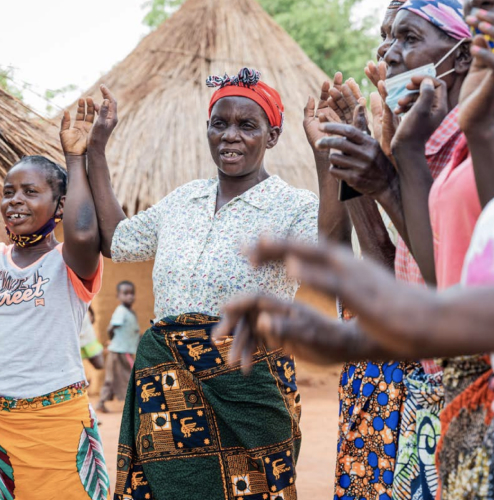
Social protection programs are a proven way to get people out of poverty, improve their education and health, and support them in times of shock and crisis. In Zambia, families are benefitting from cash transfers and programs that support women’s livelihoods and keep girls in school — all supported by the World Bank’s Girls’ Education and Women’s Empowerment and Livelihoods (GEWEL) Project.
GEWEL is providing a hand-up out of poverty for hundreds of thousands of people. Cash transfers have helped families feed and educate their children. Primary school attendance is up by 10%. Families have increased the land they farm by 18%, maize production by 8%, and their livestock by 21%. Support is enabling men and women to start small businesses and keep their children in school for longer.
Read more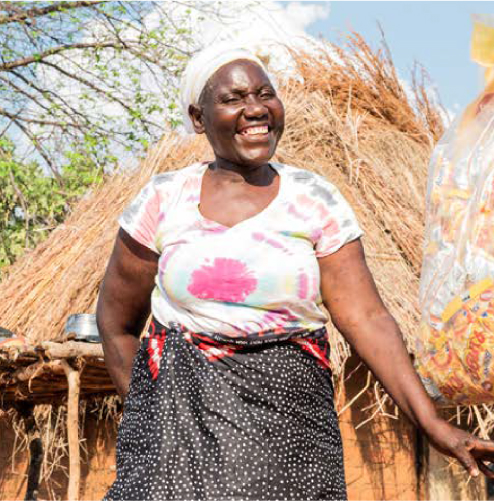
I never thought I could run my own business. But because of 3 weeks training in life and business skills, and belonging to Titukuke Savings Group, I’ve been able to buy cement to build a house and grocery shop.
Supporting Women’s Livelihoods (SWL) beneficiary, Chisoni Village, Nyimba District
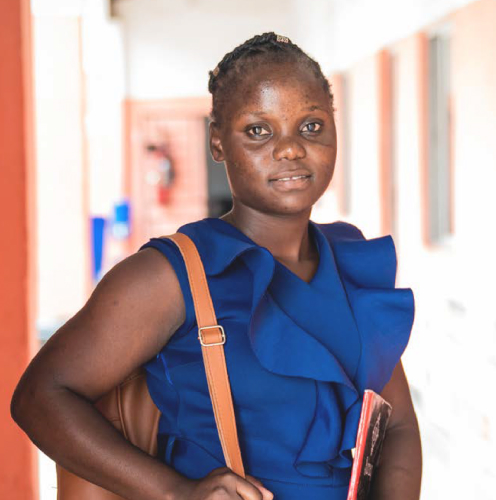
KGS helped me to complete high school…Girls should work extra hard so that they too can find themselves in university. It is important so that they are able to have a better future.
North End University student and former Keeping Girls in School (KGS) beneficiary
973,000
families
More than 973,000 families received cash transfer in 2021 — 25% of Zambia’s population, with plans to reach 30% in 2022
59,000
girls
More than 59,000 girls in 39 districts have received support to cover the cost of their secondary school education
75,000
women
75,000 women have received livelihood support, including savings groups, life and business skills training, and productive grants
COVID-19 vaccines: A path for recovering human capital
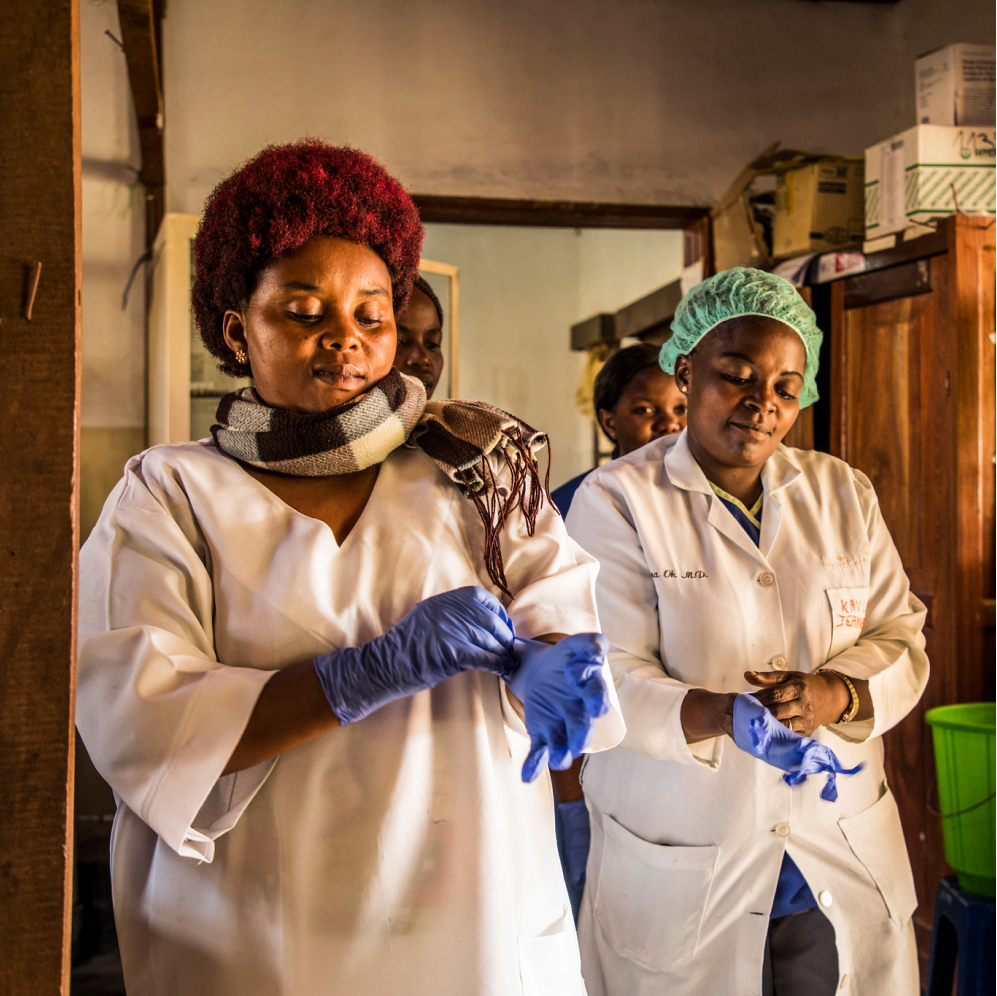
The World Bank, in an Africa-led effort in partnership with COVAX and the African Union’s Africa Vaccine Acquisition Trust (AVAT), is helping to accelerate the procurement of vaccine doses for millions. In FY22, our regional country programs deployed $2.7 billion supporting 34 COVID-19 vaccination projects in Africa, focused on vaccine procurement and accelerated roll out, enabling affordable and equitable access to vaccines needed to reverse the pandemic’s health, social, and economic impact.
The African Union has set a target to vaccinate 60 percent of the continent’s population by 2022. Vaccines remain one of our most important tools for countries to get on the path to recovery, strengthen their health systems, and improve disease outbreak prevention and preparedness infrastructures and programs.
23.24%
257.6 million
As of July 2022, 257.6 million people have received at least one dose of the COVID-19 vaccine in Sub-Saharan Africa
18.08%
200.4 million
As of July 2022, 200.4 million people have been fully vaccinated in Sub-Saharan Africa
$2.7B
deployed
In FY22, World bank regional country programs deployed $2.7 billion supporting 34 vaccination projects in Africa
Cabo Verde: Fighting the pandemic
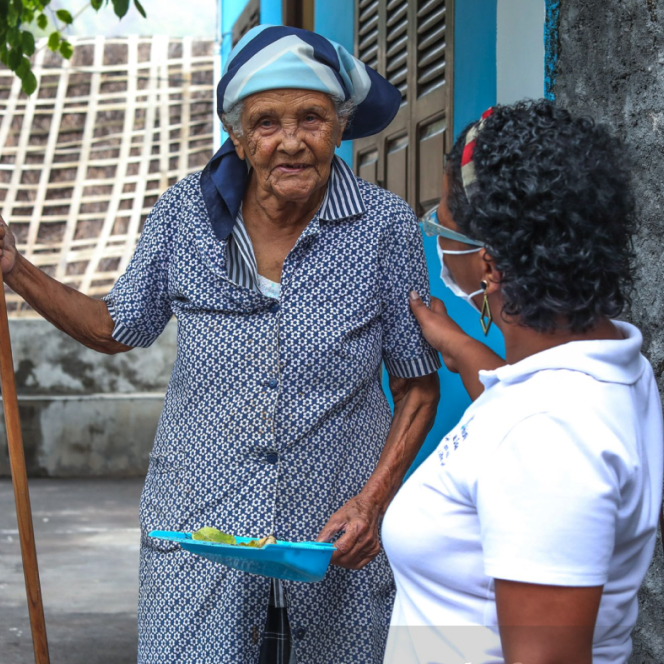
Tourism is a lifeline for Cabo Verde, generating 25% of its GDP and 23% of formal jobs. When COVID-19 hit, Cabo Verde closed its borders to prevent the virus from spreading. The move took a toll on people’s lives and livelihoods. Tourism suddenly stopped and many Cabo Verdeans lost their job.
News about a vaccine gave hope for the summer season of 2021, but getting vaccines to more than 400,000 people spread across 10 islands was no small endeavor. Thanks to a strong health system and a sound supply strategy, Cabo Verde has become a model for COVID-19 response. It has much to teach its neighbors on how to carry out vaccination campaigns.
Read more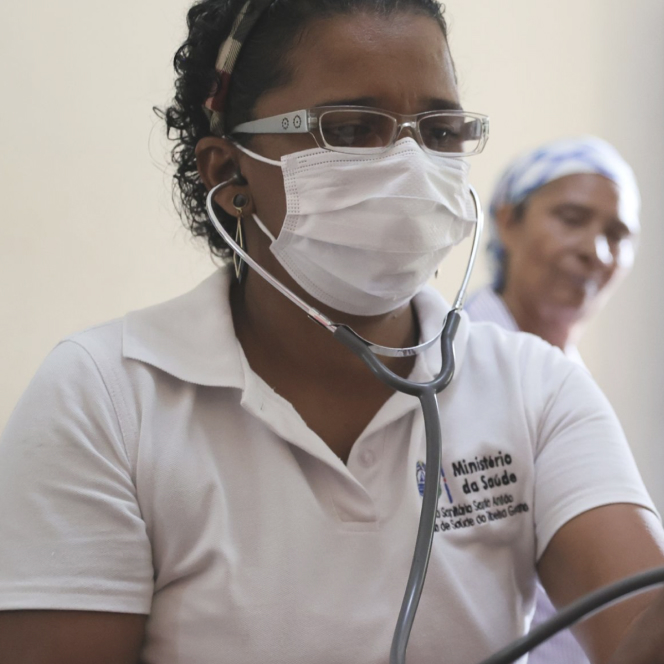
As a health worker, you have to show ‘humanism,’ listen to people, respect them as human beings, and be sensitive to their point of view. You need to enter into their world to convince them and explain that vaccination saves lives.
Nurse Alice Bentoub, dedicated to the health of her community, and first person to get the COVID-19 vaccination on the island
>70%
population
Over 70% of Cabo Verde’s adult population is vaccinated, the third highest coverage against COVID-19 in Sub-Saharan Africa
27%
vaccination
27% jump in vaccination coverage occurred with the launch of a digital health pass, making it mandatory to show proof of vaccination to access venues
$15
million
$15 million from IDA has helped Cabo Verde purchase and deploy vaccines for at least 400,000 people
São Tomé and Príncipe:
Solar-powered cold chain key to
achieving last mile vaccination
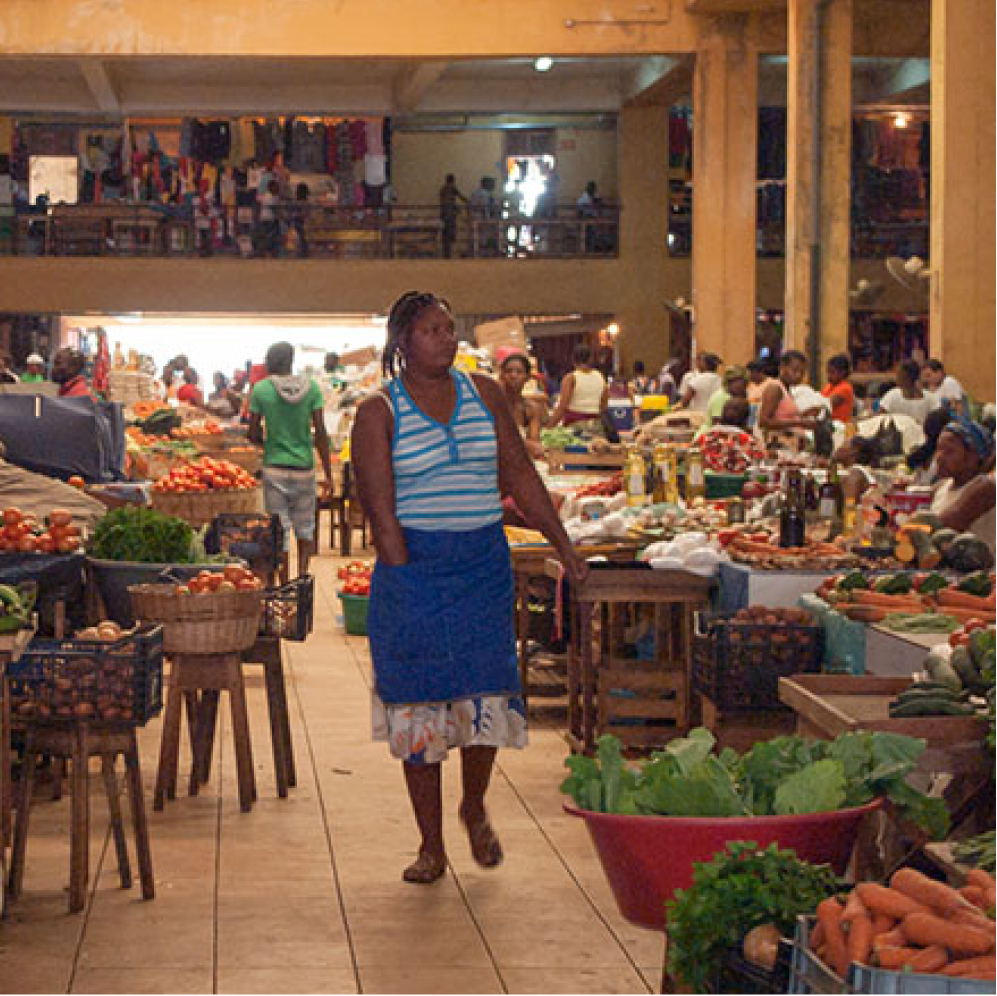
São Tomé and Príncipe (STP), a two-island nation, is a hidden gem that glistens and floats off the coast of West Africa. A Portuguese-speaking archipelago with a population of 220,000 individuals, of which 96% live on the island of São Tomé and the other 4% on the island of Principe, STP is a small and insular state that faces challenges accessing a range of resources, particularly medical resources. This has had a direct impact on the health sector, as limited inputs affect the quality of health services available to its population. This is further compounded by sparse human resources on the island, let alone those with specialized skills.
Read moreThe Sahel:
Sustainable solutions for
people, climate, and infrastructure
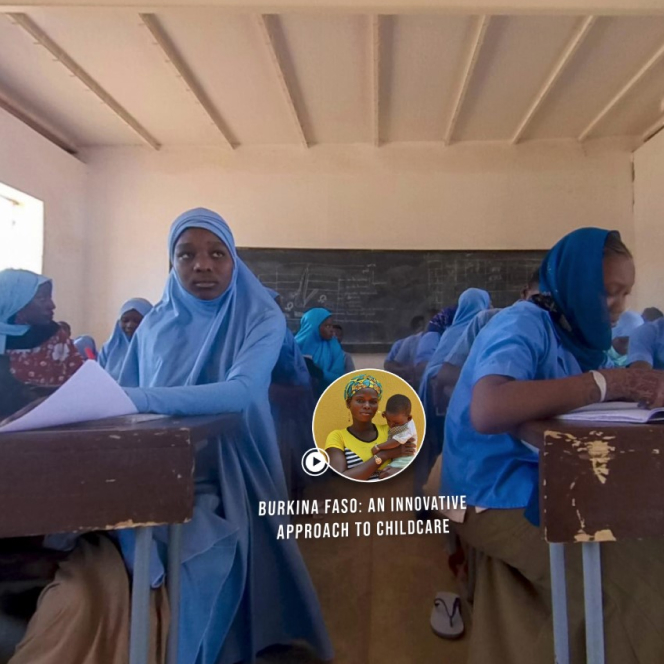
The Sahel region is highly affected by climate change and fragility, which undermine food security, long-term development prospects, and opportunities for the next generation. Adaptive social protection helps build the resilience of poor and vulnerable households, by investing in their capacity to prepare for, cope with, and adapt to shocks — ensuring that they do not fall deeper into poverty.
Experience the impact of projects for people, climate, and infrastructure on A Virtual Journey into the Sahel Visit Niger to learn how health care workers and community members are coming together to improve medical services for women and their children in rural areas. Go to Chad to see how better rural roadways are leading to greater agricultural productivity and food security. Visit Burkina Faso to learn how local communities are protecting and expanding forests to improve their land and livelihoods.
Read more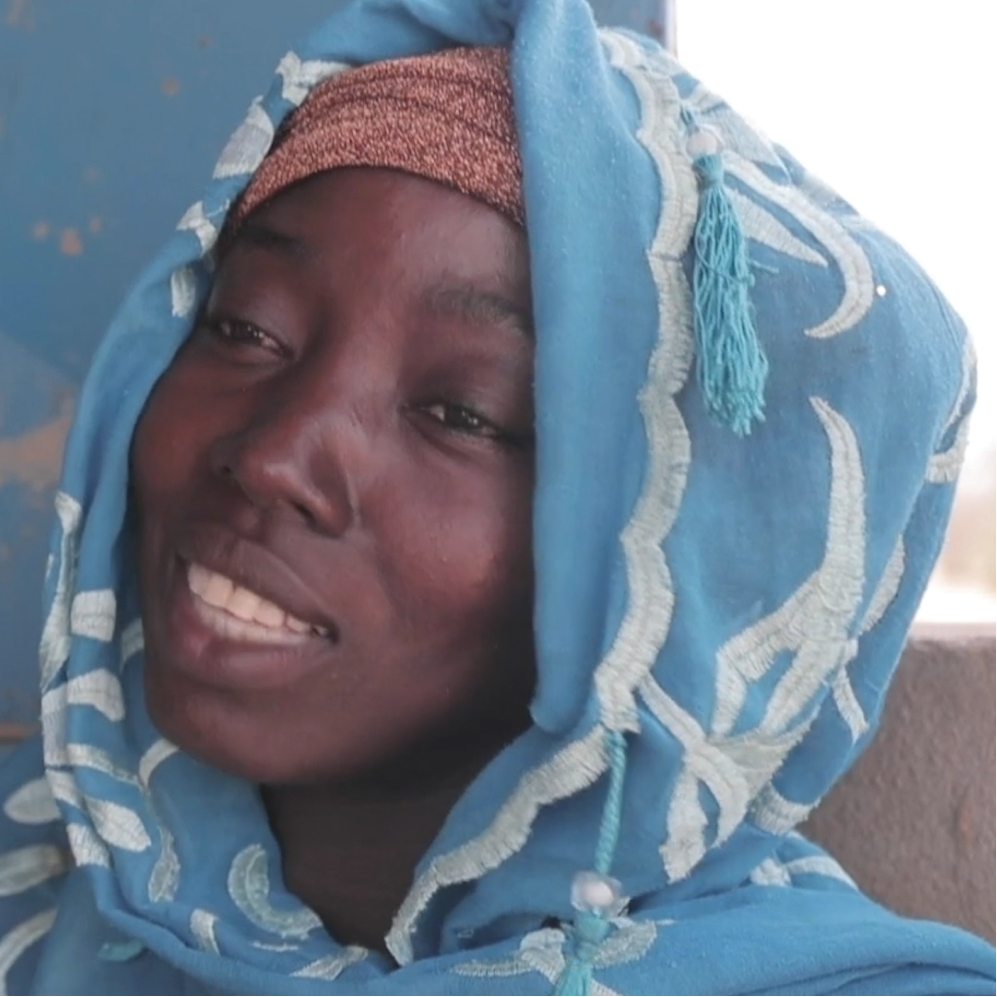
I used to give birth at home. In case of a problem, I had no assistance. Since the project was set up, I have been giving birth at the clinic because I know that in case of a problem, I will be taken care of.
Mother and beneficiary of initiatives to boost prenatal consultations and assisted deliveries in Niger
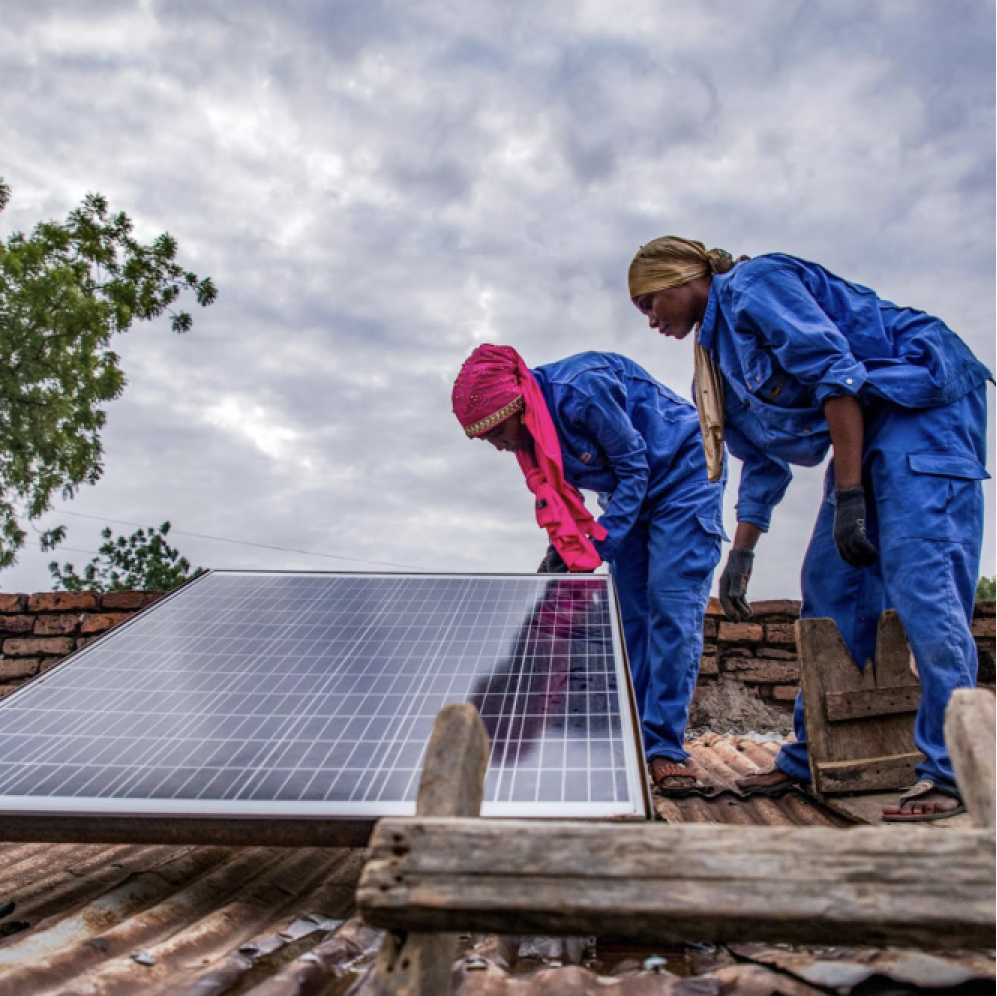
We are making a living installing solar panels. Ever since I learned how to do a paid job, I’ve wanted my sisters to follow my example. If they learn skills, they will be able to work and earn money too.
Mother and electrician who reinvented herself through professional training and the launch of a women-owned business in her hometown in Chad
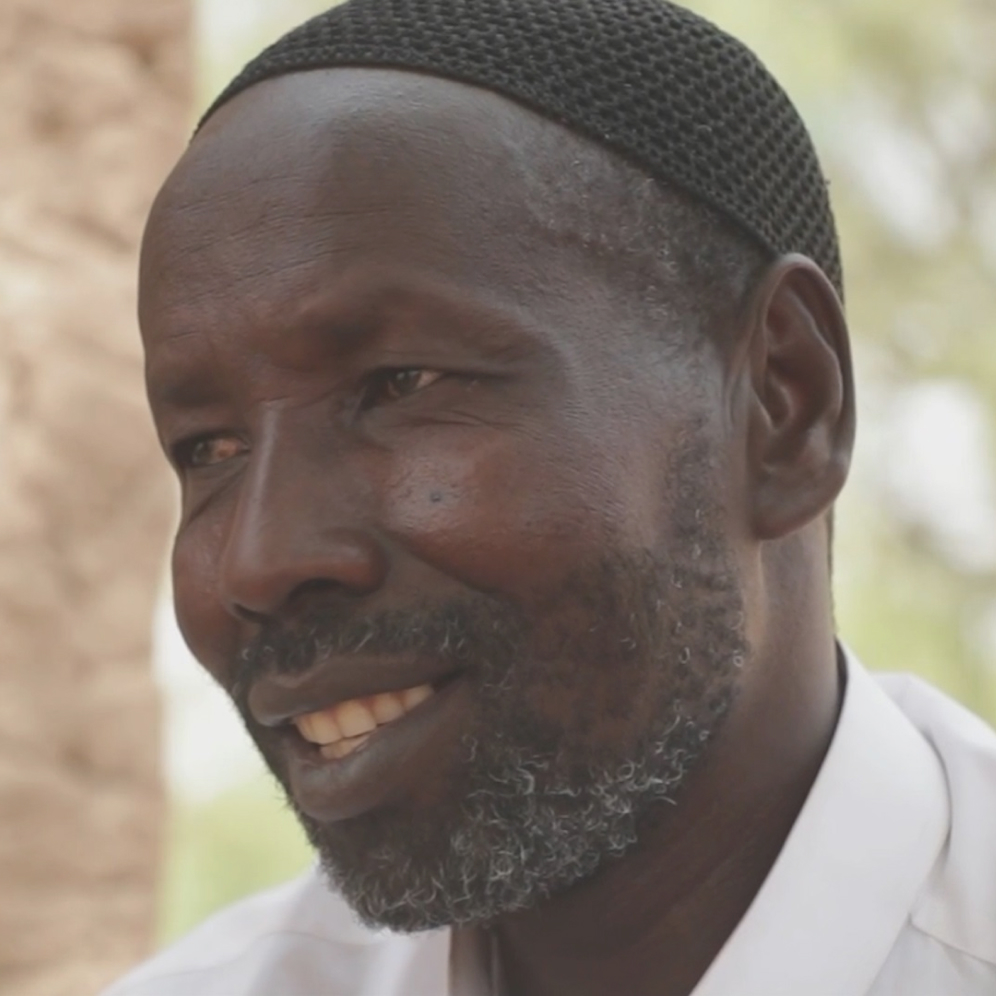
It is important for future generations to protect the environment because we depend on it. If it disappears, we will also disappear.
Farmer who is helping his community in Niger adopt climate-smart agricultural practices to restore degraded lands and boost yields
Empowering the next generation of Africa’s scientists
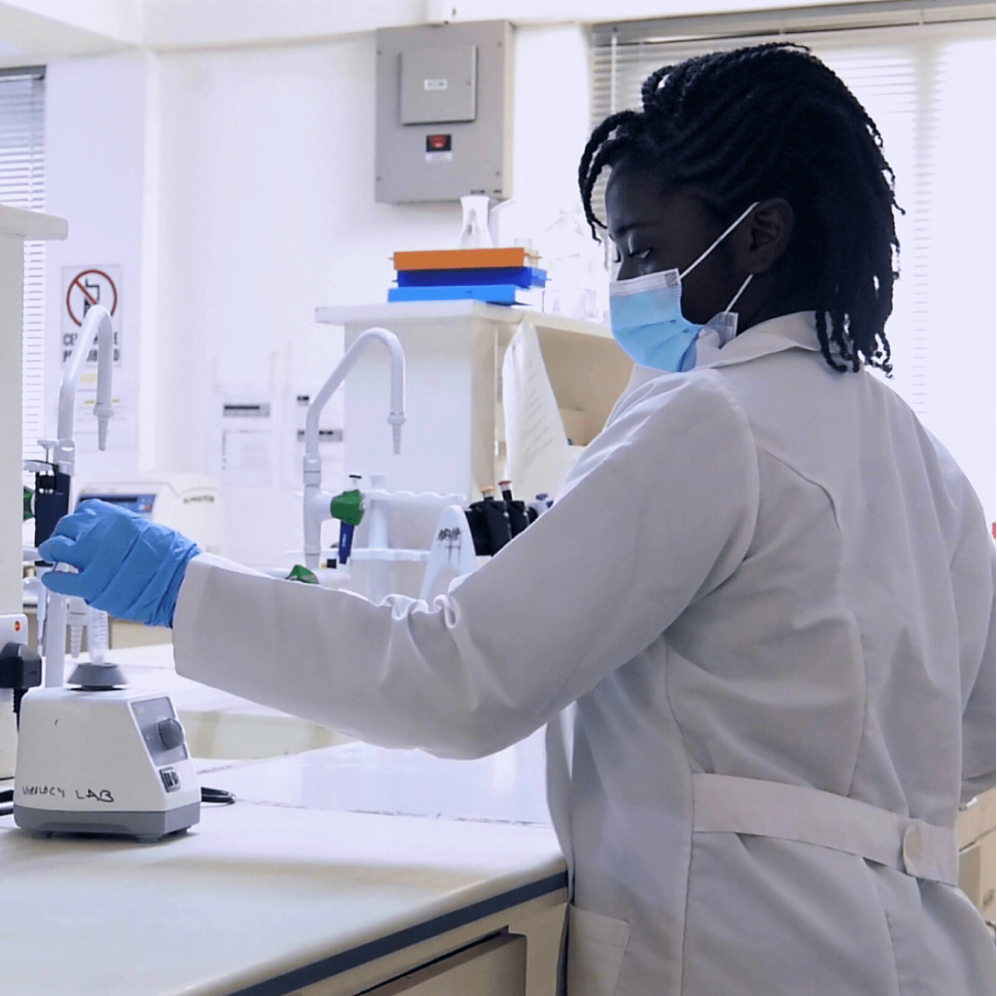
Increased productivity, economic diversification, and structural reforms across Africa require more highly skilled and employable graduates, particularly in key fields related to science, technology, engineering, and mathematics (STEM), as well as health and agriculture. The Africa Higher Education Centers of Excellence (ACE) Project is helping universities in 11 countries improve the quality, quantity, and development impact of postgraduate education.
The ACE for Genomics of Infectious Diseases (ACEGID) at Redeemer’s University in Nigeria is using its project funds, knowledge base, and collaboration with internal and external researchers to counter immediate health threats like COVID-19 and to detect and respond to future outbreaks. ACEGID is working to train a critical mass of scientists capable of using genomics-based tools to monitor, control, and eliminate infectious diseases.
Read moreWe can’t always wait for the westernized countries to come in and solve our problems for us. We are not deficient when it comes to manpower or intelligence. Why not utilize what we have to solve our own problems?
pursued a Master of Science (MSc) in Molecular Biology and Genomics at ACEGID
Read more
My experience at ACEGID helped me to understand standard laboratory procedures and safety protocols better. They were the first things that I applied when I returned to Liberia, and I shared with my team here. These have helped us a lot as we work on COVID-19 samples.
Master of Science Student, ACEGID and Research Associate, Division of Public Health and Medical Research, National Public Health Institute of Liberia
Read more
500+
Over 500 local and regional postgraduate and short-term students, 33% women, supported at ACEGID since 2014
480+
Over 480 students, health care professionals, and faculty members trained through ACEGID short-term courses
200+
Over 200 peer-reviewed journal articles published by ACEGID’s academic staff, including in the prestigious international journal Nature
Knowledge exchange
and activities
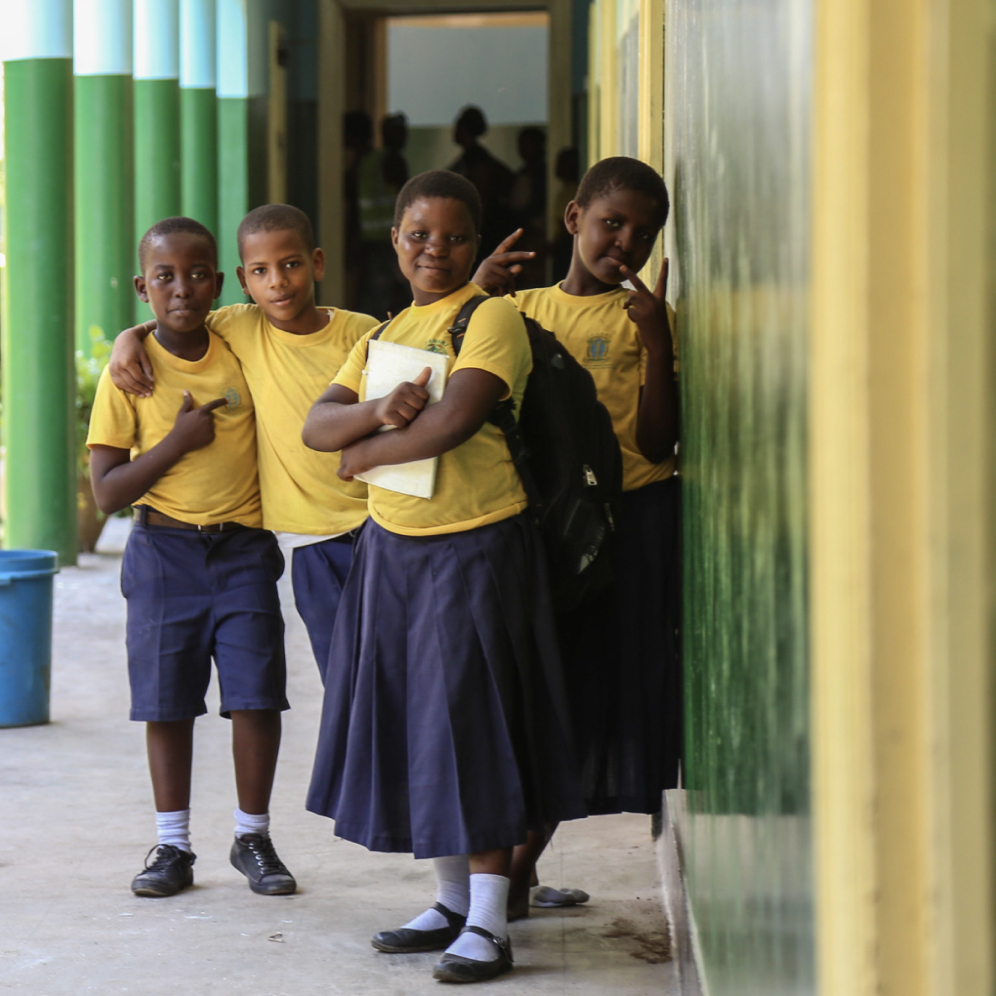
This year, the Africa HCP has maintained and strengthened its commitment in advancing knowledge products that help countries and development stakeholders to prioritize resource use and execute evidenced-based solutions for sustainable human development outcomes. Our knowledge and learning products – which span countries, regions, and sectors – include our advisory services and analytics (ASA) products which offer technical assistance, through research and analysis, for stronger development objectives and strategies; data to monitor progress toward development goals as well as help inform evidence-based policy making and reforms; and knowledge sharing and exchange platforms for disseminating lessons learned and best practices on the global development agenda.
Working together with governments, partners, and stakeholders, our community of practice serves as a viable platform for shared goals for protecting and preserving Africa’s human capital.
Greater resilience
and better data
As this first phase of Africa HCP enters its final year of implementation and we plan for the next phase, we are using lessons learned before and during the COVID-19 pandemic to make pragmatic adjustments that are more attuned to evolving realities on the ground. Climate change, political instability, food insecurity, and other shocks and crises threaten human capital gains. Work is underway to enable larger scale solutions and more tailored upstream solutions built on four key components:














